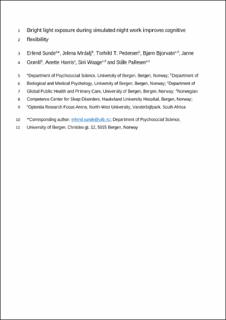| dc.contributor.author | Sunde, Erlend | |
| dc.contributor.author | Mrdalj, Jelena | |
| dc.contributor.author | Pedersen, Torhild Thue | |
| dc.contributor.author | Bjorvatn, Bjørn | |
| dc.contributor.author | Grønli, Janne | |
| dc.contributor.author | Harris, Anette Kristoffersen | |
| dc.contributor.author | Waage, Siri | |
| dc.contributor.author | Pallesen, Ståle | |
| dc.date.accessioned | 2022-04-27T12:28:41Z | |
| dc.date.available | 2022-04-27T12:28:41Z | |
| dc.date.created | 2022-03-28T14:08:52Z | |
| dc.date.issued | 2022 | |
| dc.identifier.issn | 0742-0528 | |
| dc.identifier.uri | https://hdl.handle.net/11250/2993035 | |
| dc.description.abstract | Night work leads to sleepiness and reduced vigilant attention during work hours, and bright light interventions may reduce such effects. It is also known that total sleep deprivation impairs cognitive flexibility as measured by reversal learning tasks. Whether night work impairs reversal learning task performance or if bright light can mitigate reversal learning deficits during night work is unclear. In this counterbalanced crossover study (ClinicaTrials.gov Identifier NCT03203538), young healthy individuals completed a reversal learning task twice during each of three consecutive simulated night shifts (23:00–07:00 h). The night shifts were performed in a laboratory under a full-spectrum (4000 K) bright light (~900 lx) and a standard light (~90 lx) condition. Reversal learning task performance was reduced towards the end of the night shifts (04:50 h), compared to the first part of the night shifts (00:20 h) in both light conditions. However, with bright light, the reversal learning task performance improved towards the end of the night shifts, compared to standard light. The study shows that bright light may mitigate performance deficits on a reversal learning task during night work and implies that bright light interventions during night work may be beneficial not only for vigilant attention but also for cognitive flexibility. | en_US |
| dc.language.iso | eng | en_US |
| dc.publisher | Taylor & Francis | en_US |
| dc.rights | Attribution-NonCommercial-NoDerivatives 4.0 Internasjonal | * |
| dc.rights.uri | http://creativecommons.org/licenses/by-nc-nd/4.0/deed.no | * |
| dc.title | Bright light exposure during simulated night work improves cognitive flexibility | en_US |
| dc.type | Journal article | en_US |
| dc.type | Peer reviewed | en_US |
| dc.description.version | acceptedVersion | en_US |
| dc.rights.holder | Copyright 2022 Taylor & Francis | en_US |
| cristin.ispublished | true | |
| cristin.fulltext | postprint | |
| cristin.qualitycode | 1 | |
| dc.identifier.doi | 10.1080/07420528.2022.2050922 | |
| dc.identifier.cristin | 2013037 | |
| dc.source.journal | Chronobiology International | en_US |
| dc.source.pagenumber | 948-963 | |
| dc.identifier.citation | Chronobiology International. 2022, 39 (7), 948-963. | en_US |
| dc.source.volume | 39 | |
| dc.source.issue | 7 | |

